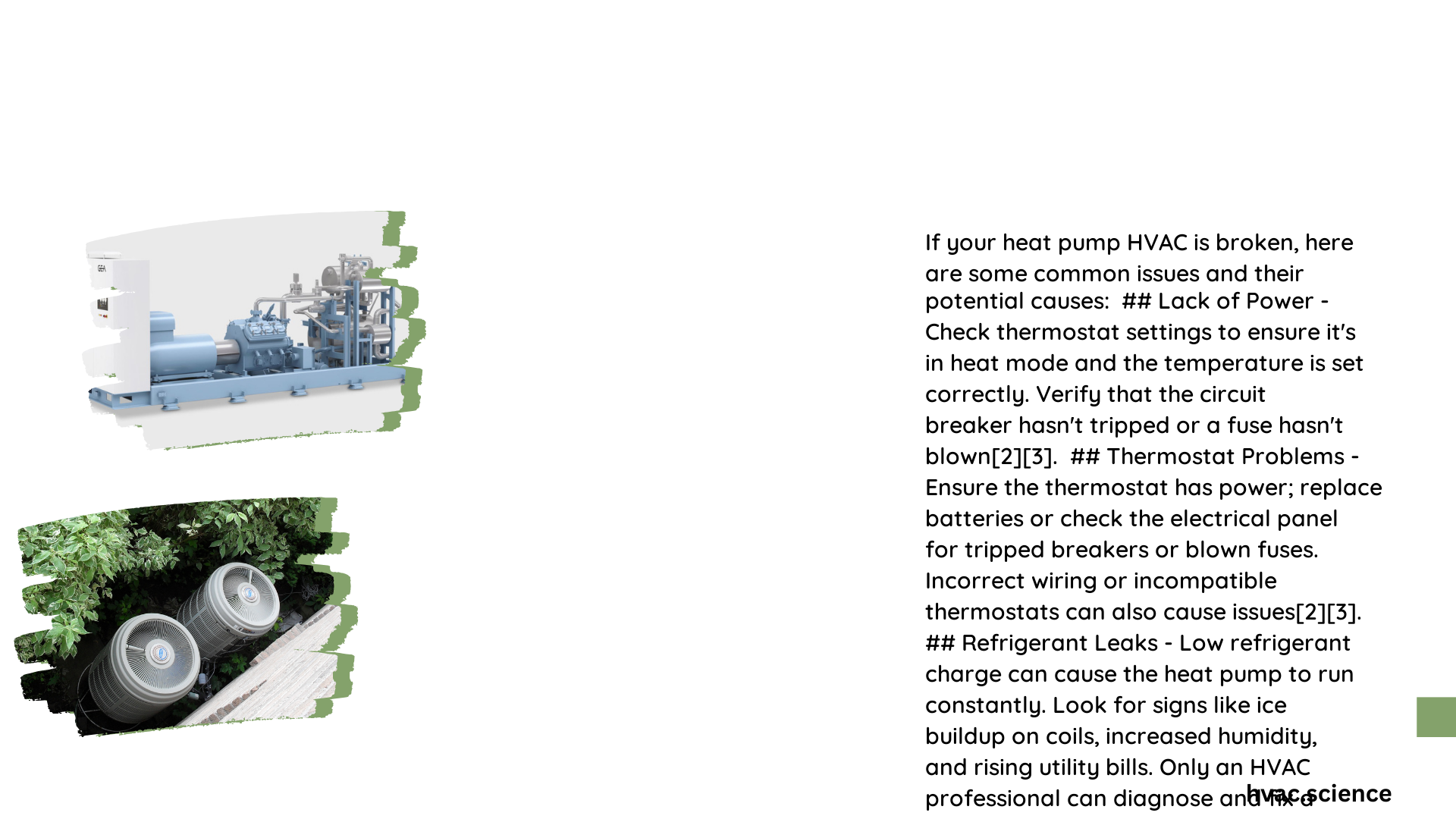A heat pump HVAC system is a crucial component of home comfort, providing both heating and cooling. When it breaks down, it can lead to discomfort and increased energy costs. This comprehensive guide explores the symptoms of a broken heat pump HVAC, offers troubleshooting steps, and provides maintenance tips to prevent future breakdowns.
What Are the Signs of a Broken Heat Pump HVAC?
Heat pump HVAC systems can exhibit various symptoms when they’re not functioning correctly. Recognizing these signs early can help prevent more severe damage and costly repairs. Here are the key indicators:
What Unusual Noises Should You Listen For?
- Grinding: This often indicates a mechanical problem, such as dirty motor bearings.
- Gurgling: Suggests a refrigerant leak or low refrigerant levels.
- Buzzing: Usually points to a refrigerant leak, particularly concerning if heard inside the home.
- Clanging or Banging: May be caused by the fan hitting against another metal piece.
- Rattling, Screeching, or Squealing: Could be due to a loose fan belt or issues with the central air fan motor.
How Does Performance Change When a Heat Pump HVAC Breaks?
- Uneven Heating or Cooling: Hot and cold spots throughout the home.
- Increased Energy Bills: A significant spike in energy consumption.
- Ice Buildup: Excessive ice formation on the outdoor unit, especially in summer.
What Strange Smells Might Indicate a Problem?
- Musty or Rotting Odors: Could indicate mold formation or an animal inside the unit.
- Burning Smells: Suggest electrical issues or overheating components, potentially a fire hazard.
How Can You Troubleshoot a Broken Heat Pump HVAC?

When faced with a malfunctioning heat pump HVAC, follow this step-by-step troubleshooting process:
- Check Air Filters and Coils (15-30 minutes)
- Inspect and clean or replace dirty air filters and coils.
-
Ensure no blockages around the outdoor unit.
-
Inspect for Refrigerant Leaks (30-60 minutes)
- Use a refrigerant leak detector to identify any leaks.
-
If found, contact an HVAC technician for repair.
-
Check Thermostat Settings (10-15 minutes)
- Ensure correct thermostat settings and proper functioning.
-
Look for calibration issues or faulty heat anticipators.
-
Evaluate Noises and Vibration (15-30 minutes)
- Identify the source of unusual noises.
-
Check for loose parts, dirty motor bearings, or other mechanical issues.
-
Check Electrical Components (30-60 minutes)
- Use a multimeter to check for electrical issues.
-
Look for faulty capacitors or malfunctioning control boards.
-
Inspect Defrost Mechanism (30-60 minutes)
- Ensure the defrost mechanism is working correctly.
- Check for faulty sensors, controls, or relays.
What Tools Are Needed for Troubleshooting?
- Multimeter
- Refrigerant leak detector
- Air filter testing kit
- Screwdrivers and wrenches
- Safety gloves and goggles
How Can You Prevent Heat Pump HVAC Breakdowns?
Regular maintenance is key to preventing heat pump HVAC breakdowns. Here’s a maintenance schedule to follow:
| Maintenance Task | Frequency | Materials | Estimated Cost |
|---|---|---|---|
| Air Filter Maintenance | Every 30 days | New air filters | $5-$20 per filter |
| Coil Cleaning | Every 3-6 months | Coil cleaning brush, garden hose | Free (DIY) or $50-$100 (professional) |
| Thermostat Calibration | Every 6 months | None | Free (DIY) or $50-$100 (professional) |
| System Inspection | Annually | None | $100-$200 (professional) |
| Defrost Mechanism Check | Every 6 months | None | Free (DIY) or $50-$100 (professional) |
What Are Common Causes of Heat Pump HVAC Failures?
Understanding the common causes of heat pump HVAC failures can help in prevention and early detection:
- Refrigerant Leaks: Often due to improper installation or wear and tear.
- Mechanical Issues: Problems with motor bearings, fan belts, and other components.
- Electrical Issues: Faulty capacitors, control boards, or other electrical components.
- Poor Maintenance: Failure to clean air filters, coils, and perform regular inspections.
How Can These Failures Be Mitigated?
- Implement a regular maintenance schedule, including air filter changes and coil cleaning.
- Schedule annual inspections by an HVAC technician to identify potential issues early.
- Ensure proper installation and sizing of the heat pump system.
By following these guidelines, you can significantly reduce the risk of heat pump HVAC breakdowns and extend the life of your system. Remember, while some maintenance tasks can be done DIY, always consult a professional for complex issues or if you’re unsure about any aspect of your heat pump HVAC system.
References:
1. https://oceanstateac.com/blog/how-do-i-know-if-my-heat-pump-is-bad
2. https://snowflakeair.com/heat-pump-problem-signs/
3. https://www.rentecdirect.com/blog/heat-pump-problems/
